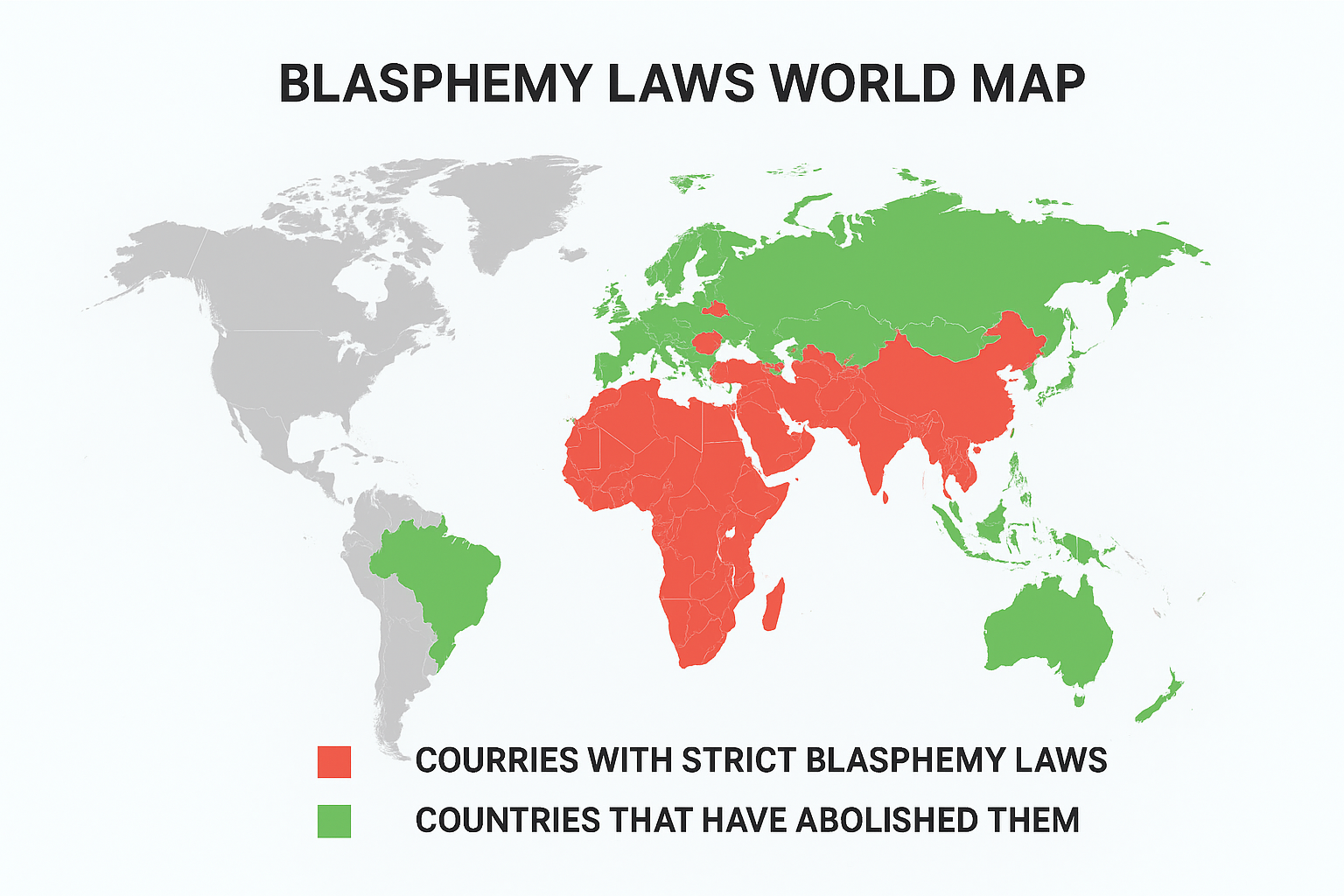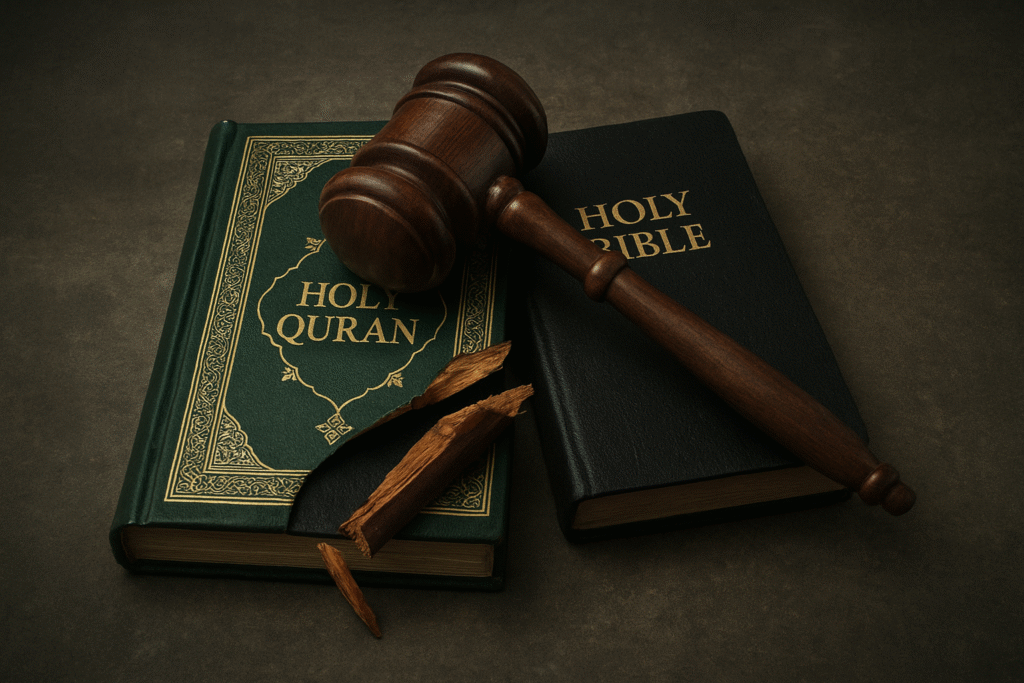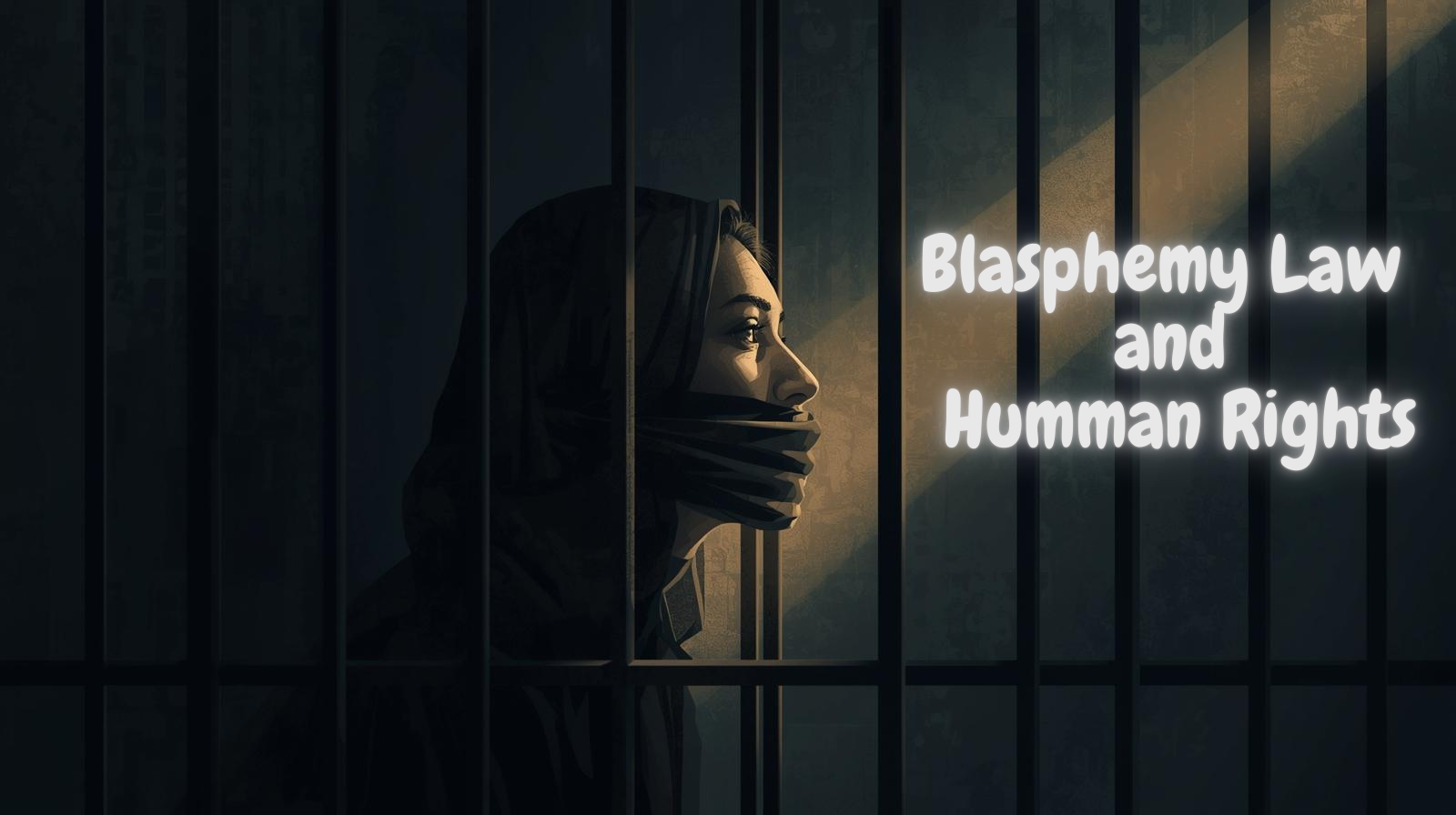Introduction
Blasphemy laws exist in several countries, often justified as a way to protect religion, prevent chaos, and preserve social order. In practice, however, these laws are far from protective. Instead of fostering respect, they frequently silence dissent, fuel mob violence, and violate basic human rights. Around the world, people accused of blasphemy face prison, exile, and even death. Their only “crime” is speaking, writing, or questioning a belief system.
The issue is especially severe in countries such as Pakistan, Iran, Saudi Arabia, and Afghanistan, where accusations of blasphemy can lead to public executions or lynchings. International human rights groups have consistently condemned these laws, pointing out that they violate freedom of thought, expression, and conscience. To understand this issue fully, we must look at how blasphemy laws developed, how they are enforced today, and what impact they have on both individuals and society.

Historical Roots of Blasphemy Laws
Blasphemy laws did not originate in modern times. In fact, almost every major religion has attempted to criminalize criticism at some point. Christianity punished so-called heretics during the Middle Ages through inquisitions and public executions. Judaism, too, had strict rules against uttering the divine name in vain. Islam carried its own history of punishing “disrespect” toward Allah or the Prophet Muhammad.
Although these laws often claimed to protect sacred values, they served a political function as well. Rulers used them to enforce obedience and suppress challenges to authority. In many cases, accusations of blasphemy were less about faith and more about silencing political or social dissent. Consequently, the laws became tools of fear rather than genuine respect.

Blasphemy Laws in the Modern World
Today, more than 60 countries still have some form of blasphemy legislation. Among them, a handful enforce it harshly, often imposing death penalties or life imprisonment. For example, Pakistan’s Penal Code 295 and 298 make insulting the Prophet Muhammad, the Quran, or Islam punishable by death or long-term imprisonment. Even minor accusations can spiral into mob violence before courts even intervene.
In Iran and Saudi Arabia, blasphemy laws are tied directly to Sharia law. People accused of insulting religion or spreading “false doctrines” face corporal punishment, imprisonment, or even execution. In countries like Indonesia, blasphemy laws have been weaponized against minorities, such as Christians, Hindus, and atheists. In each of these cases, the laws create fear instead of harmony.
Meanwhile, Western democracies, which once had blasphemy laws, have almost entirely abolished them. The United Kingdom repealed its law in 2008, Ireland in 2018, and several European nations followed suit. This global trend highlights a growing recognition: protecting religion does not require silencing critics.
Human Rights Violations
Blasphemy laws directly clash with international human rights standards. The Universal Declaration of Human Rights (Article 18) guarantees freedom of thought, conscience, and religion. Likewise, Article 19 protects the right to freedom of expression, including the freedom to criticize ideas, institutions, and beliefs.
However, blasphemy laws erase these freedoms. They criminalize individuals for words or thoughts, often ignoring due process. In countries with weak legal protections, false accusations are common. Personal disputes, land conflicts, or simple misunderstandings can escalate into blasphemy charges. Once accused, a person’s life may never be safe again.
Moreover, these laws disproportionately target vulnerable groups. Religious minorities, women, activists, and even children have been accused of blasphemy. Their voices are silenced not because they committed crimes, but because they dared to exist or speak differently.
The Social Impact of Blasphemy Laws
The consequences of blasphemy laws extend beyond individual victims. They affect entire societies by cultivating fear and intolerance. When people fear punishment for questioning authority, critical thinking disappears. Education suffers because open discussions about religion, history, or ethics become dangerous.
Additionally, blasphemy laws encourage mob justice. In Pakistan, dozens of people have been lynched by angry crowds before courts could intervene. Rumors of disrespect are enough to spark riots, burn houses, or destroy businesses. These situations destabilize societies rather than strengthen them.
Instead of promoting unity, blasphemy laws divide communities along religious lines. Minorities are treated with suspicion, while majorities feel entitled to enforce their beliefs on others. This fosters hatred, discrimination, and violence.
Case Studies: Voices Silenced
One of the most well-known cases is that of Asia Bibi, a Christian woman from Pakistan. She was accused of blasphemy in 2009 after a dispute with her neighbors. Despite weak evidence, she spent nearly a decade on death row. Although she was eventually acquitted, she had to flee the country for safety. Her story illustrates how easily blasphemy accusations can ruin lives.
Another tragic example is Mashal Khan, a young university student in Pakistan. He was lynched by a mob in 2017 after false allegations of blasphemy spread online. His murder shocked the nation, but similar cases continue to occur.
Such examples prove that blasphemy laws are not only misused but also lethal. They give ordinary people the power to act as judges, juries, and executioners, with devastating consequences.

Why Blasphemy Laws Fail Their Purpose
Supporters argue that blasphemy laws prevent religious conflict by protecting faith. In reality, they achieve the opposite. Instead of calming tensions, these laws inflame anger and encourage violence. They reward intolerance by giving legal authority to punish differences of opinion.
Furthermore, true faith does not need legal protection. Ideas, unlike people, cannot be harmed physically. If a religion is strong, it should be able to withstand criticism. Silencing critics only reveals insecurity rather than strength.
The Path Toward Reform
Reforming or abolishing blasphemy laws is not simple. In many countries, religion and politics are deeply intertwined, making legal change difficult. However, progress is possible. Activists, journalists, and international organizations continue to pressure governments to uphold human rights.
Education is another critical step. When societies teach tolerance, empathy, and critical thinking, the reliance on oppressive laws decreases. Dialogue between communities can also reduce tensions, showing that respect does not require silence.
Ultimately, protecting freedom of speech is not about attacking religion. It is about ensuring that all individuals — regardless of belief — can live without fear of persecution.
Conclusion
Blasphemy laws are not a defense of faith. They are tools of control, silencing, and fear. They violate human rights, endanger minorities, and destabilize societies. History shows that when nations cling to such laws, they move further from justice and closer to oppression.
If humanity is to progress, these laws must be challenged. Every person has the right to question, believe, or disbelieve without the threat of violence. True respect comes not from forced silence but from open dialogue. As long as blasphemy laws exist, human freedom will remain incomplete.
IF you want to Know about my story click here


very interesting points you have mentioned, thankyou for posting.
Simply a smiling visitant here to share the love (:, btw outstanding design.